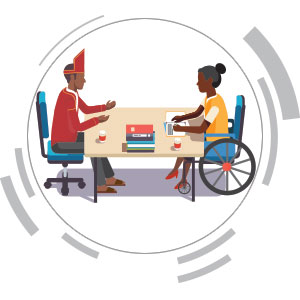
What should government and employers be doing to reduce the barriers to employment for women, people with disabilities, and other vulnerable groups? What policies can help improve employment access for all and provide an inclusive workplace?
Indonesia’s 1945 Constitution guarantees the right of all citizens to freedom, equal opportunity and protection from all forms of discrimination, including special protection for vulnerable groups. Indonesia has affirmed its commitment to the application of these principles in employment through the ratification of several International Labour Organization conventions regarding wages and non-discrimination in the workplace.
Despite this, barriers to decent employment remain, with women and other minority groups facing a range of obstacles, particularly in recruitment, remuneration, working hours, promotion, self-development opportunities, and other areas. This is evident in the rate of women’s participation in the workforce, which has remained at an average of 50% for 20 years, while men’s participation has increased to 84%. On average women also earn only 77% of the wage that men earn for the same type of work. Workforce participation among persons with disabilities is also low (74.4%), and the majority of these workers are employed in the informal sector because of difficulties in accessing formal work and/or an inclusive working environment.
This sub-theme aims to explore:
- Approaches to expanding access for vulnerable groups to productive economic activities and supporting skills development;
- Policies to reduce barriers to decent employment for vulnerable groups;
- Approaches to raising awareness among employers to create an inclusive working environment and equal employment opportunities;
- Approaches to increasing collaboration among employers, employees and unions to build their capacity to apply principles of equality and non-discrimination in the workplace;
- How to improve enforcement of and access to legal protection against workplace discrimination;
- Smart practices from other countries that can be adapted to the Indonesian context.

